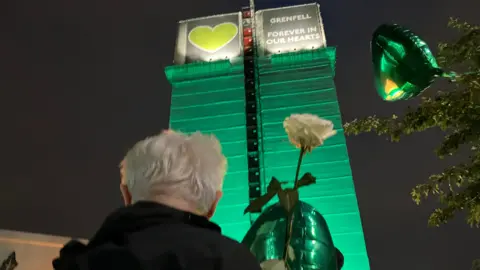
 BBC
BBC
We have been here before, haven’t we?
The Infected Blood Inquiry, the Post Office Inquiry, Hillsborough, Bloody Sunday.
And now Grenfell.
They are moments that force each of us to collectively look at ourselves – our society, our institutions, our priorities.
Governance, regulations, culture, attitudes, truth, candour.
The depressing conclusion any reader will take from the vast Grenfell Tower Inquiry report is the sheer breadth of failure, in how many directions the fingers of blame can point.
Government, yes, but governments – Conservative, coalition, Labour, national and local.
The construction industry; a whole litany of companies and contractors.
This was the first time Sir Keir Starmer, as prime minister, has had to try to find the words to speak on behalf of the country in response to not just a tragedy but a failure of such breadth.
He now has the responsibility to steer and deliver the scale of response the report demands.
Firstly, let’s look at this in the context of housing.
The government has promised 1.5 million new homes within the next five years – and yet there are hundreds of thousands still living in flats deemed unsafe.
These are often now unwanted, unsellable homes, people trapped there awaiting improvements long promised and not yet delivered.
The housing market gummed up, people unable to move and all this at time when there is huge demand for more homes.
And when the developers, the contractors, the wider construction industry, often criticised, are also part of the solution to what many see as a housing crisis.
Can an ambitious home building target be met, and quickly, without cutting corners that might harbour the next disaster and while simultaneously sorting out the injustices Grenfell has exposed?
The government has said it will respond in full to the Grenfell report in six months and then provide annual updates on the implementation of the recommendations.
A final thought about where all this leaves us.
The tragedy and failures at Grenfell Tower are clear to see.
But how should we reflect on this public inquiry, and all those others that I mentioned earlier?
Should they leave us depressed and pessimistic, or capable of the belief that this is part of justice, however defined, being done?
The stark truth in this instance is this report is at best a work-in-progress, long in progress – with many still waiting to see changes in governance, regulation, culture, attitude and indeed criminal justice all these years on.








